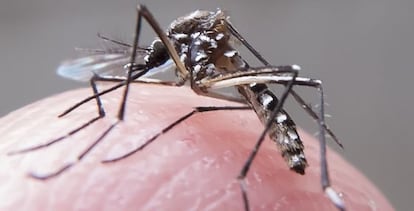Ten questions and answers about the Zika virus
The key points about the mosquito-borne illness, which can cause birth defects

1. What is the Zika virus?
It is a virus similar to dengue and yellow fever that was first discovered in Uganda’s Zika forest in 1947 among monkeys who were being controlled and monitored for yellow fever. It remained relatively unknown until 2007 when an outbreak took place on Yap and other islands that make up the Federated States of Micronesia in the Pacific that affected 8,187 people. Between October 2013 and February 2014, a new outbreak occurred in French Polynesia where 8,264 cases were reported.
2. How is it transmitted?
The Zika virus is usually spread by the Aedes aegypti mosquito, which also carries dengue fever. But there have been cases that have shown that it can also spread through sexual transmission, from mother-to-baby in the womb, and through blood. The virus cannot be transmitted via breast feeding.
In Brazil, 3,530 cases of microcephaly related to the Zika virus were registered between October 2015 and the beginning of this year
3. What are the main symptoms and signs of the disease?
Most people infected do not develop any clinical signs, but when they do, the most common are fever, rash, pain in the joints and muscles, conjunctivitis (red eyes) and headaches. Less frequently, symptoms can also include swelling, sore throat, coughing, vomiting, and blood in the semen. In general, the symptoms usually go away on their own in three to seven days. However, joint pain can last for up to a month.
4. Is there any treatment for the Zika virus?
There is no known treatment but the symptoms can be controlled by taking paracetamol or dipyrone to manage the fever and aches. Antihistamines can also be used to control rashes. Medical experts warn against taking any medications that contain acetylsalicylic acid (aspirin) or other anti-inflammatories because they increase the risk of complications from hemorrhaging.
5. What is the link between the Zika virus and microcephaly?
The Brazilian Health Ministry confirmed the connection when, at the end of November, authorities saw a rise in microcephaly in some states where there had also been an increase in the number of Zika virus cases. The conclusion was reached after a study showed the presence of the virus in blood samples taken from a baby who was born with microcephaly and later died. It is not yet known how the virus reacts in humans or how it sets off microcephaly, but researchers are conducting more studies.
Experts recommend using repellents and installing mosquito netting over doors and windows to avoid being bitten
In Brazil, 3,530 cases of microcephaly related to the Zika virus were registered between October 2015 and the beginning of this year. Authorities are also investigating the deaths of 46 newborns with microcephaly and their possible links to the Zika virus.
The United States recently registered its first microcephaly case linked to the virus in Hawaii. According to The New York Times, the mother of the baby had traveled to Brazil last May.
6. What are the recommendations for pregnant women?
The US’s Centers for Disease Control and Prevention (CDC) has recommended that pregnant women put off traveling to 14 nations and territories in Latin America, including Brazil, Colombia and Puerto Rico.
In Brazil, health authorities recommend that pregnant women protect themselves from insect bites by avoiding going out at certain hours of the day, covering themselves, and using repellents.
7. Is there a vaccine?
There is no vaccine against the Zika virus.
8. How can it be prevented?
At the moment, the Aedes aegypti mosquito is the main suspect responsible for causing the virus. The key is to stop standing water from accumulating in places such as tires, plant pots or any open containers were the mosquitoes might breed. The Aedes aegypti also transmits the dengue fever and chikungunya viruses. Experts recommend using repellents and installing mosquito netting over doors and windows to avoid being bitten.
9. What countries have been most affected by the Zika virus?
According to the World Health Organization (WHO), the Zika virus was only reported last year in nine countries in the Western Hemisphere: Brazil, Chile (including Easter Island), Colombia, El Salvador, Guatemala, Mexico, Paraguay, Surinam and Venezuela. US authorities have also reported cases of the Zika virus.
10. Has the Zika virus caused any deaths?
Brazil has confirmed three deaths that are possibly related to the Zika virus. The victims were a newborn, a man who suffered from lupus, and a 16-year-old girl.
English version by Martin Delfín.
Tu suscripción se está usando en otro dispositivo
¿Quieres añadir otro usuario a tu suscripción?
Si continúas leyendo en este dispositivo, no se podrá leer en el otro.
FlechaTu suscripción se está usando en otro dispositivo y solo puedes acceder a EL PAÍS desde un dispositivo a la vez.
Si quieres compartir tu cuenta, cambia tu suscripción a la modalidad Premium, así podrás añadir otro usuario. Cada uno accederá con su propia cuenta de email, lo que os permitirá personalizar vuestra experiencia en EL PAÍS.
¿Tienes una suscripción de empresa? Accede aquí para contratar más cuentas.
En el caso de no saber quién está usando tu cuenta, te recomendamos cambiar tu contraseña aquí.
Si decides continuar compartiendo tu cuenta, este mensaje se mostrará en tu dispositivo y en el de la otra persona que está usando tu cuenta de forma indefinida, afectando a tu experiencia de lectura. Puedes consultar aquí los términos y condiciones de la suscripción digital.








































